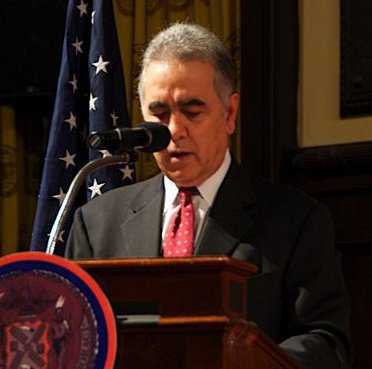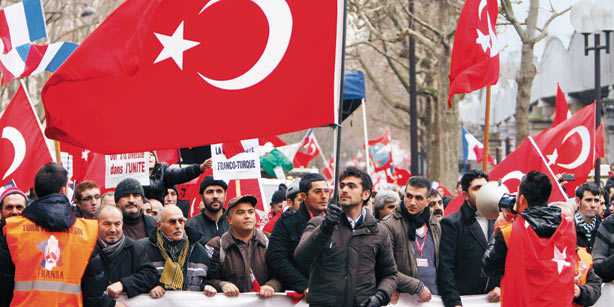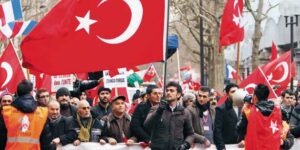Turkey Has to Develop Large Firms in Order to Become an Active Player in Energy Sector
Tuesday, 24 January 2012
Journal of Turkish Weekly (JTW) conducted an exclusive interview with Saban Kardas. Saban Kardas is assistant professor at TOBB University of Economics and Tecnology in Ankara. He is also assistant editor of Insight Turkey, a quarterly journal in circulation since 1999, which is published by SETA Foundation.
Q: Would Turkey not be successful if it pursued its energy policy through TPAO, equipped with specific power and well-designed by the state, rather than extending state aid? In this context, is the Azerbaijan SOCAR (State Oil Company of Azerbaijan Republic) a successful model? Is it possible for Turkey’s energy policy to be changed substantially?
A: To start with, Turkey and Azerbaijan’s energy policies are different, and will be misleading to start analysis of Turkey’s energy policies with a comparison between them. While as an energy rich producing country Azerbaijan envisions a different set of priorities in its energy policies, Turkey’s energy policy is driven by first and foremost a concern to meet its own needs. Beyond that, Turkey works to assume a role in energy policies as a transit country. The shaping of energy policies in the countries of origin on the one hand and transit countries, i.e., countries that host the transportation routes, on the other, as well as specific institutional structures they devise take place in different settings.
Going back to the core issue raised in your question: whether Turkey should develop its energy policies by moving to a private-sector driven model or a model based on some form of state control or intervention in the market. Alongside TPAO, BOTAS needs to be mentioned in the context of transit projects. There are market pressures on BOTAS to reduce its market share. There is also a similar expectation from external players, especially the EU. Turkey is responding to these expectations and reducing state involvement but it is difficult to say that it has progressed to an extent that it can satisfy the demands coming from outside. There are different arguments made in support of the opposing models, referring back to your question. As it is sometimes underlined in the ongoing discussions in Turkey, it makes sense to reduce the element of state intervention to the extent possible. From a liberal logic, one can make the argument that a more effective and efficient system can be developed by this approach.
However, as a counter line of thought argues, in markets regulating strategic commodities, energy being one of them, there are some reasons to adopt some degree of state-control. The key concern in Turkey is that if such a strategic commodity is left to market forces alone, it is hard to develop competitive national players. Such concerns on Turkey’s part have been underlined in the debate taking place in the energy markets. It is widely believed that as it seeks to assert its importance in energy geopolitics, Turkey has to develop large firms in order to become an active player in this field. Firms with big capital need to emerge for global competition. It is not unlikely to occur in free market conditions, but it will be difficult. The best way to do so would be to develop an energy giant with state support. For this reason, Turkey, as in the case of BOTAS, was for some time resisting the pressures to move to a free market-oriented model and retain it as a major player, despite the pressures coming from outside. Recently, as it has been brought to the public’s attention in the context of gas purchase contracts from Russia, Turkey in fact has started to reduce the monopoly over natural gas imports. Similarly, the domestic distribution grid has been privatized to a large extent. Granted, overall, Turkey is heading to a more market-oriented model. Yet, as stated by Energy Minister Taner Yıldız on several occasions, despite a market-oriented model, Turkey wants to retain a decisive capacity for the state to make critical interventions in the operation of market. This appears to be the official prognosis for the future of the state in energy market.
Going back to the question on the SOCAR (State Oil Company of Azerbaijan Republic) model, it is early to answer this question, in the sense that the process of SOCAR’s consolidation in the market has yet to be finalized. In this context, what SOCAR is trying to do is in essence to replicate GAZPROM model of Russia, i.e., using its position as a major producer to develop projects aiming to penetrate into downstream markets and gain control over transportation and distribution networks, so that it can maximize profits. The Trans-Anatolia agreement is the most obvious example for SOCAR’s quest to play such a prominent role. Seen from that perspective, this model is not applicable to Turkey, given that Turkey does not stand a chance to become a player in the chain running from the source or producing nations to the distribution networks. So, it is hard to compare Turkey’s energy sector to SOCAR model, given the structural differences.
Since the SOCAR model is still in the making, one has to wait and see how it will come into full fruition and whether it will accomplish its objectives. It is early to make a realistic assessment. But so far, Azerbaijan is exporting oil and gas and in addition to that it has undertaken major investments in Turkey’s energy sector. So, one can safely say that it has accomplished some progress in downstream markets as well. To sum up, in Azerbaijan, one might expect the emergence of a structure similar to the one in Russia and it has recorded some progress in that regards.
At this point, one has to note some problems with the GAZPROM model, assuming that SOCAR also pursues a similar approach. In this model, there are debates as to the fusion of the state and business interests; i.e., political authorities shaping the economic decisions or economics dominating political decisions, all the while GAZPROM and other energy giants being at the center of these intermingling relations. If SOCAR follows a similar route to the Russian model, in the mid- to long-term, how the relationship between politics and economics will be forged and whether interest groups formed around energy industry may eventually hinder democratization and good governance are issues that beg closer inspection. If Azerbaijan might be opting for this model, such questions also need to be discussed more candidly.
Finally, Turkey will unlikely to follow these models. As underlined, while moving toward a market-oriented model, Turkey will develop a structure that enables effective state interventions into the market, through the control of a critical share by the state.
Q: The signing of the agreement regarding the Trans-Anatolian pipeline, which included Azerbaijan and Turkey, can be considered a blow to Nabucco on the one hand, and giving permission to South Stream might make Europe more dependent on Russia on the other. Was it a reaction against France because of the political air in recent months?
A: Personally, I do not think the recent developments regarding pipeline projects are directly related to the Armenian allegations. For instance, France has not been particularly supportive of Nabucco. On the contrary, the French are somehow involved in South Stream, having overtaken some of the shares in the project. So, it is difficult to argue that Turkey wanted to hurt France by thwarting Nabucco. There is no such direct connection, and Turkey’s decision(s) are not intended to convey a message to Europe. Both the Trans-Anatolian and the South Stream pipelines should be assessed based on their particular conditions, as well as from Turkey’s own perspective, and how Turkey sees them in line with its priorities in energy policies.
I don’t think Trans-Anatolia is a blow to Nabucco. Turkey is a country that has always supported the Nabucco as a strategic project and clearly has expressed its commitment. Nabucco continues to play a key role in Turkey’s objectives to become an energy hub. But there are certain structural problems in the Nabucco project itself, and unfortunately, they have not been clearly resolved so far. As is well known, uncertainty over dedicated supplies, lack of financing and lack of unequivocal purchase commitments are other major hurdles. Previously, there used to be uncertainty over the transit regime which occasionally led to crises between Turkey and the EU. Through an understanding Turkey reached with the Europeans earlier, it eliminated those problems.
One of the drivers of the Trans-Anatolian pipeline is Azerbaijan’s quest for an independent role in energy markets, which I underlined earlier. Turkey has taken a step in support of Azerbaijan’s role. But while providing this support, Turkey also reiterated the fundamental rationale of the Nabucco, i.e., giving approval to a direct corridor from the Caspian basin to European markets traversing Turkey. Turkey hereby sent a signal and reiterated its earlier position that it will not be an obstacle to the so-called Southern corridor. There were some uncertainties regarding the future of the Nabucco project as originally envisaged, which obviously delayed its realization. There had been concerns that the original design might be overambitious and aim at unrealistically high capacity. The joint Azerbaijani-Turkish initiative now enables a reconfiguration of Nabucco in more manageable scales. It is difficult to say that this route is altogether dead, as the rationale underpinning it also is at the core of the Trans-Anatolia.
Turkey’s support for South Stream is a separate debate, because there is a direct competition with Nabucco there. Turkey has taken similar complementary steps in the past as well. After supporting Nabucco, Turkey demonstrated that it would not be the country that prevents South Stream. In that regards, we can say Turkey has not adopted a new position. The recent moves towards Trans-Anatolia and South Stream is a continuation of the previous position in the recent context.
Q: The energy agreement signed by Turkey in recent weeks further brought Azerbaijan and Turkey together. In the coming years, will Ankara develop an Azerbaijan-oriented policy despite Yerevan, or create its own policy regarding energy?
A: Based on the previous discussions, it is worth emphasizing a few points. Firstly, it is difficult for Turkey to develop independent energy policies under the current conditions. If we are talking about supply security in this context, it has different implications. If we are discussing this question in the context of Turkey’s goal of becoming an energy transit corridor, it needs to be handled differently.
If we try to answer your question in this second dimension, i.e., energy transportation, it is difficult for Turkey to develop energy policies independent of Azerbaijan in the short to medium term. For Turkey to emerge a transit corridor and develop major transit routes, the producers of oil and gas have to give their approval. Azerbaijan is the first and only viable option at this point. In this sense, the Trans-Anatolian agreement signed with Azerbaijan, and the earlier agreements signed at the High Level Strategic Cooperation Council summit between Prime Minister Recep Tayyip Erdogan and President Ilham Aliyev, finalized Turkey’s first real transit agreement in natural gas markets. Although we have been proud of becoming a hub country, so far it remained at the rhetorical level and has yet to be realized. The compromise reached subsequent to the treaty signed with Azerbaijan allows Turkey to become a natural gas transit route for the first time. In this context, it is difficult for Turkey to develop a policy completely independent of Azerbaijan.
Apart from this, which alternative players are there? Exporting natural gas reserves in northern Iraq through Turkey has been on the agenda of the northern Iraqi leaders. However, there are problems between Baghdad and provinces as to how to use the natural resources of Iraq. The other option is obviously Iran. Tehran’s strained relations with America, among other factors, limit the ability of Iran to emerge as a major alternative for Turkey’s ambitious to become a transit hub. On the other hand, Russia does not want to market its natural gas through Turkey.
However, it can be said that Turkey has a growing role at present regarding the oil transportation. The Yumurtalik–Kirkuk pipeline, the Baku–Tbilisi–Ceyhan pipelines or tankers through the sea lanes play an important role in the transportation corridors controlled by Turkey. Beyond these developments, Turkey also has achieved limited progress in terms of reaching its ambitions. Especially, concerning the transport of Kazakh and Russian oil through Turkey, major issues remain. In short, as of now, talking about a role independent of Azerbaijan is difficult.
Going back to the other issues raised in the question, yes, there has been a rapprochement between Turkey and Azerbaijan. Particularly, the current government’s policy is in favor of close relations with Azerbaijan and we might expect the continuation of this policy. There is no reason for Turkey to give up its Azerbaijan-oriented policy in the upcoming years, especially if the economic partnership continues to deepen between them, as is the case currently. These ties between Turkey and Azerbaijan, in a sense, create disincentives for a possible rapprochement between Armenia and Turkey. For Turkey to be drawn into normalization process, the Armenian side, in its approach towards Turkey, has to understand that there is not only an emotional dimension in the Turkish-Azerbaijani relationship, or a strategic dimension, but there is also a very strong economic dimension. It would be advisable for Armenia to consider its position on Turkey by taking into account these various angles.
Tuesday, 24 January 2012
Journal of Turkish Weekly







